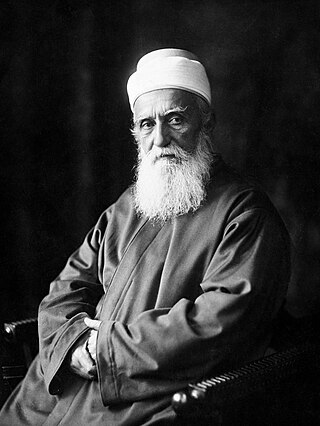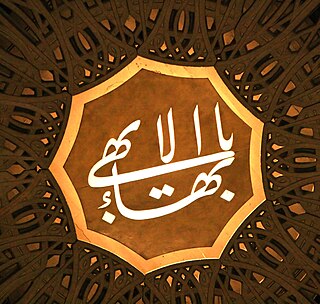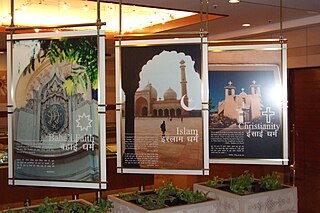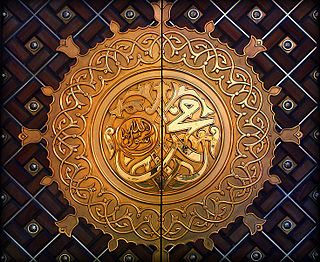Related Research Articles

ʻAbdu'l-Bahá, born ʻAbbás, was the eldest son of Baháʼu'lláh and served as head of the Baháʼí Faith from 1892 until 1921. ʻAbdu'l-Bahá was later canonized as the last of three "central figures" of the religion, along with Baháʼu'lláh and the Báb, and his writings and authenticated talks are regarded as sources of Baháʼí sacred literature.

Shoghí Effendi (; 1 March 1897 – 4 November 1957) was the grandson and successor of ʻAbdu'l-Bahá, appointed to the role of Guardian of the Baháʼí Faith from 1921 until his death in 1957. He created a series of teaching plans that oversaw the expansion of the faith to many new countries, and also translated many of the writings of the Baháʼí central figures. He was succeeded by an interim arrangement of the Hands of the Cause until the election of the Universal House of Justice in 1963.

Mírzá Muhammad ʻAlí was one of the sons of Baháʼu'lláh, the founder of the Baháʼí Faith. He was the eldest son of his father's second wife, Fatimih Khanum, later known as Mahd-i-'Ulya, whom Baháʼu'lláh married in Tehran in 1849. Muhammad ʻAlí received the title from his father of G͟husn-i-Akbar.
Baháʼu'lláh was the founder of the Baháʼí Faith. He was born in 1817 to Khadíjih Khánum and Mírzá Buzurg of Nur, a Persian nobleman, and went on to be a leader in the Bábí movement, and then established the Baháʼí Faith in 1863. Baháʼu'lláh's family consists of his three wives and the children of those wives.
The following is a basic timeline of the Bábí and Baháʼí religions emphasizing dates that are relatively well known. For a more comprehensive chronology of the timeline, see the references at the bottom.

In the Baháʼí Faith there are two covenants, deemed the 'greater' and 'lesser'. The greater covenant refers to an agreement of progressive revelation: that God will send messengers about every thousand years, and it is humanity's duty to recognize them and respond to their teachings. The lesser covenant is the agreement between the faith's founder, Baháʼu'lláh, and his followers, regarding the succession of leadership and the maintenance of unity.
Progressive revelation is a core teaching in the Baháʼí Faith that suggests that religious truth is revealed by God progressively and cyclically over time through a series of divine Messengers, and that the teachings are tailored to suit the needs of the time and place of their appearance. Thus, the Baháʼí teachings recognize the divine origin of several world religions as different stages in the history of one religion, while believing that the revelation of Baháʼu'lláh is the most recent, and therefore the most relevant to modern society.
The Manifestation of God is a concept in the Baháʼí Faith that refers to what are commonly called prophets. The Manifestations of God are appearances of the Divine Spirit or Holy Spirit in a series of personages, and as such, they perfectly reflect the attributes of the divine into the human world for the progress and advancement of human morals and civilization through the agency of that same Spirit.
The Baháʼí teachings represent a considerable number of theological, ethical, social, and spiritual ideas that were established in the Baháʼí Faith by Baháʼu'lláh, the founder of the religion, and clarified by its successive leaders: ʻAbdu'l-Bahá, Baháʼu'lláh's son, and Shoghi Effendi, ʻAbdu'l-Bahá's grandson. The teachings were written in various Baháʼí writings. The teachings of the Baháʼí Faith, combined with the authentic teachings of several past religions, are regarded by Baháʼís as revealed by God.

Martha Louise Root was an American traveling teacher of the Baháʼí Faith in the early 20th century. From the declaration of her belief in 1909 until her death thirty years later, she went around the world four times. Shoghi Effendi, then head of the Baháʼí Faith, called her "the foremost travel teacher in the first Baháʼí Century", and named her a Hand of the Cause posthumously. Known for her numerous visits with heads of state and other public figures, of special importance was her interaction with Queen Marie of Romania, considered the first royal to accept Baháʼu'lláh.
One of the fundamental teachings of the Baháʼí Faith is that men and women are equal and that equality of the sexes is a spiritual and moral standard essential for the unification of the planet and a prerequisite for peace. Baháʼí teachings stress the importance of implementing this principle in individual, family, and community life. Nevertheless, the Baháʼí notion of the full spiritual and social equality of the two sexes does not imply sameness, so that gender distinction and differentiation are observed in certain areas of life. Significantly, while women can and do serve in an extensive range of elected and appointed positions within the Baháʼí administration at both national and international levels, they are not permitted to serve as members of the Universal House of Justice, the supreme governing institution of the Baháʼí Faith.

Unity of religion is a core teaching of the Baháʼí Faith which states that there is a fundamental unity in many of the world's religions. The principle states that the teachings of the major religions are part of a single plan directed from the same God. It is one of the core teachings of the Baháʼí Faith, alongside the unity of God, and the unity of humanity.
Mírzá Músá was the only full brother of Baháʼu'lláh, meaning that they shared the same mother and father. He was later named by Shoghi Effendi as one of the nineteen Apostles of Baháʼu'lláh.
Baháʼí literature covers a variety of topics and forms, including scripture and inspiration, interpretation, history and biography, introduction and study materials, and apologia. Sometimes considerable overlap between these forms can be observed in a particular text.
Some Answered Questions is a compilation of table talks of ʻAbdu'l-Bahá that were collected by Laura Clifford Barney between 1904 and 1906 across several pilgrimages. The book was first published in English in 1908. ʻAbdu'l-Bahá was the son of Baháʼu'lláh, the founder of the Baháʼí Faith, and was appointed by him as his successor and interpreter of his words.
The writings of founding members of the Bahá'í Faith include prophetic statements of future events, some of which are viewed by Bahá'ís as having been fulfilled. According to Bahá'í belief, there have been individuals throughout history who were Manifestations of God, who founded major world religions and had certain supernatural powers, such as the ability to prophesy. The belief in fulfilled prophecies is presented by Bahá'í authors to demonstrate the validity of Bahá'u'lláh's claim to divinity.

In Baháʼí cosmology reality is divided into three divisions. The first division is God, who is preexistent and on whom the rest of creation is contingent. The second division is God's Logos, the Primal Will, which is the realm of God's commands and grace. This realm pervades all created things. The Manifestations of God, Messengers from God, are appearances of the Logos in the physical world. The third division is Creation, which includes the physical world. Creation is not seen as confined to the material universe, and individual material objects, such as the Earth, are seen to come into being at particular moment and subsequently break down into their constituent parts. Thus, the current universe is seen as a result of a long-lasting process, evolving to its current state. In the Baháʼí Faith, the whole universe is a sign of God and is dependent on him and humanity was created to know God and to serve his purpose.
The Baháʼí Faith (بهائی) has a following of at least several hundred people in Lebanon dating back to 1870. The community includes around 400 people, with a centre in Beit Mery, just outside the capital Beirut, and cemeteries in Machgara and Khaldeh. On the other hand, the Association of Religion Data Archives estimated some 3,900 Baháʼís in 2005.

Baháʼís venerate Muhammad as one of a number of prophets or "Manifestations of God", but consider his teachings to have been superseded by those of Baháʼu'lláh, the founder of the Baháʼí Faith.
References
- ↑ "ENOCH - JewishEncyclopedia.com". www.jewishencyclopedia.com. Retrieved 2015-09-29.
- ↑ In Judaism and Islam the classification of some people as prophets includes those who are not explicitly called so in the Hebrew Bible or Quran. Judaism also uses religious texts other than the Hebrew Bible to define prophets. Moreover, Orthodox rabbis use different criteria for classifying someone as a prophet, e.g. Enoch is not considered a prophet in Judaism. The New Testament may call someone a prophet even though they are not so classified in the Hebrew Bible; for example, Abel, Daniel, and Enoch are described in the New Testament as prophets.
- ↑ Smith, Peter (2000). "Adam". A Concise Encyclopedia of the Baháʼí Faith. London: Oneworld Publications. ISBN 978-1-78074-480-3. OCLC 890982216 . Retrieved 2021-06-26– via Google Books.
- ↑ ʻAbdu'l-Bahá (2014) [1908]. Some Answered Questions (newly revised. ed.). Haifa, Israel: Baháʼí World Centre. ISBN 978-0-87743-374-3.
- ↑ Noegel & Wheeler 2010, p. 15.
- 1 2 3 4 5 6 7 8 9 10 11 12 13 14 15 16 17 18 19 20 21 22 23 24 25 26 27 28 29 30 31 32 33 Prophets
- ↑ Brown, Keven (1997). McLean, Jack (ed.). "Hermes Trismegistus and Apollonius of Tyana in the Writings of Bahá'u'lláh". Studies in the Bábí and Baháʼí Religions. Revisioning the Sacred: New Perspectives on a Bahá'í Theology. 8. Los Angeles: Kalimat Press: 153–187. ISBN 0-933770-96-0 – via Bahá'í Library Online.
- 1 2 3 4 5 6 7 8 9 10 11 12 13 14 15 16 17 18 19 20 21 22 23 24 25 26 27 28 Noegel & Wheeler 2010, pp. 365–6.
- 1 2 3 4 5 6 7 8 9 10 11 12 13 14 15 16 May, Dann J (December 1993). "Web Published". The Baháʼí Principle of Religious Unity and the Challenge of Radical Pluralism (Thesis). University of North Texas, Denton, Texas. p. 102. Retrieved 2010-01-02.
- ↑ Smith, Peter (2000). "Manifestations of God". A Concise Encyclopedia of the Bahá'í Faith. Oxford: Oneworld Publications. p. 231. ISBN 1-85168-184-1.
- ↑ Esslemont, J. E. (1980). Bahá'u'lláh and the New Era. Wilmette, Illinois, USA: US Baháʼí Publishing Trust. p. 2. ISBN 0-87743-160-4.
- ↑ Lecture Sialkot Pages 33-34
- 1 2 3 4 Momen, Moojan (1995). Baha'u'llah's Prophetology: Archetypal patterns in the lives of the founders of the world religions . Baháʼí Studies Review, 5.1.
- ↑ "Zoroastrianism".
- 1 2 3 4 5 6 7 8 9 10 11 12 13 14 15 16 17 18 19 20 21 22 23 24 25 26 27 28 29 30 31 32 33 34 35 36 37 38 39 40 41 42 43 Noegel & Wheeler 2010, p. 366.
- ↑ Stokes, Jim. The Story of Joseph in the Babi and Baha'i Faiths in World Order, 29:2, pp. 25-42, 1997-98 Winter.
- ↑ Babylonian Talmud, Sotah 12
- ↑ Dunbar, Hooper C. (1998). A Companion to the Study of the Kitáb-i-Íqán. Oxford, United Kingdom: George Ronald. p. 112. ISBN 0-85398-430-1.
- ↑ Noegel & Wheeler 2010, p. 178. "Joshua is not mentioned by name in the Quaran, but the exegetes ... see him as the prophetic successor to Moses."
- ↑ "15. The Ethos of Prophet Khidr". 8 June 2015.
- ↑ Research Department of the Universal House of Justice. The Sabaeans and African-based Religions in the Americas , in Lights of Irfan, 13, pp. 415-420. Wilmette, IL: Haj Mehdi Armand Colloquium, 2012.
- 1 2 3 4 5 Babylonian Talmud, Baba Bathra 15
- ↑ Noegel & Wheeler 2010, p. 116. "Muslim exegesis on Q 9:30 explains that Ezra was one of the Israelite prophets coming between Solomon and John the Baptist."
- ↑ 'Abdu'l-Bahá. Tablet about Jonah and the Whale .
- ↑ Buddhism and the Baháʼí Faith
- ↑ "Buddha and Jesus". 2000-02-16.
- ↑ Cynthia C. Shawamreh (December 1998). "Comparison of the Suriy-i-Haykal and the Prophecies of Zechariah". Wilmette Institute.
- ↑ Noegel & Wheeler 2010, p. 75. "Daniel is not mentioned by name in the Quran, nor are any passages identified by Muslim exegetes as relating to him, but there are accounts of his prophethood in later Muslim literature."
- ↑ churchofjesuschrist.org: "Book of Mormon Pronunciation Guide" (retrieved 2012-02-25), IPA-ified from «nē´um»
- ↑ Mosiah8:13-17
- ↑ Mosiah1:2
- ↑ Alma 63:1-2, Book of Mormon
- ↑ Православный церковный календарь. Имена святых, упоминаемые в месяцеслове. Имена мужские. З — Захария (Праведный) (in Russian)
- ↑ 3 Nephi 3:16-19, Book of Mormon
- ↑ Farooq, Mohammad Omar. "Imam Ibn Hazm: On Prophethood of Women". Archived from the original on 2005-03-12.
- ↑ Ibrahim, Mohammed Zayki (2015). "Ibn Ḥazm's theory of prophecy of women: Literalism, logic, and perfection". Intellectual Discourse. 23 (1). IIUM Press: 76–77. CiteSeerX 10.1.1.831.1259 . eISSN 2289-5639. ISSN 0128-4878.
- ↑ McLean, Jack (2013). John the Baptist and Baha'i Prophetic Categories: An Atypical Paradigm .
- ↑ Православный церковный календарь. Имена святых, упоминаемые в месяцеслове. Имена мужские. И — Иоанн (Пророк, Предтеча и Креститель Господень) (in Russian)
- ↑ Stockman, Robert. Jesus Christ in the Bahá'í Writings , in Baháʼí Studies Review, 2:1, Association for Baha'i Studies English-Speaking Europe, London, 1992.
- ↑ 3 Nephi 3:18-19, Book of Mormon
- ↑ churchofjesuschrist.org: "Book of Mormon Pronunciation Guide" (retrieved 2012-02-25), IPA-ified from «ma-thō´nī»
- ↑ churchofjesuschrist.org: "Book of Mormon Pronunciation Guide" (retrieved 2012-02-25), IPA-ified from «măth-ō-nī´hä»
- ↑ "Book of Mormon Pronunciation Guide" (retrieved 2012-02-25), IPA-ified from «kū´mun»
- ↑ churchofjesuschrist.org: "Book of Mormon Pronunciation Guide" (retrieved 2012-02-25), IPA-ified from «kū´ma-nän´hī»
- ↑ churchofjesuschrist.org: "Book of Mormon Pronunciation Guide" (retrieved 2012-02-25), IPA-ified from «shĕm´nän»
- ↑ "The Jaredites," The Juvenile Instructor, [1 May 1892], p. 282 n.
- ↑ Chapter 48, Book of Mormon Student Manual, Religion 121 and 122, 1996
- ↑ "Understanding the Scriptures", "Ether 2 The Jaredites Build Barges", Book of Mormon Seminary Student Study Guide, [2000]
- ↑ Momen, Moojan (2000). Islam and the Baháʼí Faith. Oxford, UK: George Ronald. ISBN 0-85398-446-8.
- ↑ Buck, Christopher; Addison Donald. Messengers of God in North America, Revisited: An Exegesis of 'Abdu'l-Bahá's Tablet to Amír Khán , in Online Journal of Bahá'í Studies, 1, pp. 180–270, Association for Baha'i Studies of New Zealand, 2007.
- ↑ Martin, Douglas. The Mission of the Báb: Retrospective 1844-1994 , in Bahá'í World, Vol. 23 (1994–1995).
- ↑ Hatcher, W.S.; Martin, J.D. (2002). The Baháʼí Faith: The Emerging Global Religion. New York: Harper & Row. ISBN 0-06-065441-4.
- ↑ Simon Ross Valentine (2008). Islam and the Ahmadiyya Jama'at: History, Belief, Practice. Columbia University Press. p. 134. ISBN 978-1-85065-916-7.
- ↑ Paghdiwala, Tasneem (2007-11-15). "The Aging of the Moors". Chicago Reader . Retrieved 2017-09-17.
- ↑ African American Religious Leaders – Jim Haskins, Kathleen Benson. 2008. p. 76.